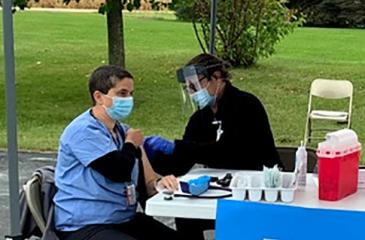Mobile Health Initiative: Advancing Health Equity through Local Partnerships and Service
COVID-19 has greatly impacted the health of Minnesotans and exacerbated the disparities present in BIPOC and immigrant communities. Hospitalizations, increased risk of viral transmission, and job loss have resulted in loss of health insurance, fewer primary care visits, and lower rates of vaccination.
To help address these disparities and more effectively reach communities in need, last year the University of Minnesota launched an interprofessional mobile health care initiative.
Supported by the Otto Bremer Trust, the Mobile Health Initiative brings together University experts and students with community partners to deliver a range of urgently needed health care services and access to follow-up care when needed.
Over the past several months, the Mobile Health Initiative has partnered with community- and faith-based organizations on more than 25 clinics and offered health and wellness screenings, vision screenings with provision of prescription glasses, dental treatments and preventive care, and COVID testing and vaccinations. The group has also distributed more than 800 reusable masks and PPE kits that included disposable masks and hand sanitizers. The number of people seen at each event has varied from approximately 30 to 150 people, most of whom are refugees, Native Americans, migrant farmworkers and other marginizalied or underserved populations.
“Being where people are—in their community rather than in a clinic setting—is really powerful,” said Jonathan Kirsch, MD, assistant professor of medicine who leads the Mobile Health Initiative. “This type of outreach is an effective way to engage with communities, especially vulnerable populations.”
Kirsch, who directs the Interprofessional Migrant Health Rotation in the University’s Medical School, has been working with the migrant farmworker communities for years in Minnesota, New York and North Carolina. Through his own experience, he realizes the value and importance of partnering with existing trusted organizations in each community.
“A lot of communities already have local health departments and clinics, faith-based groups, and other organizations doing great work to support their community members’ health and wellbeing. What we do is partner with them and share University resources and expertise for which they may not normally have access, with the ultimate goal to improve access to primary care and health outcomes for people,” said Kirsch.
While the Mobile Health Initiative initially brought together University health professionals from dentistry, nursing, pharmacy, medicine, and veterinary medicine, it has expanded to include others from areas such as informatics and architecture.
“For many of our events, we work with an architectural designer with research experience in mobile health who develops clinic site plans that take into consideration the movement and flow of people through the various health care stations. This is especially critical during this time of COVID to prevent people from congregating too closely together,” said Kirsch.
COVID-19 has greatly impacted the health of Minnesotans and exacerbated the disparities present in BIPOC and immigrant communities. Hospitalizations, increased risk of viral transmission, and job loss have resulted in loss of health insurance, fewer primary care visits, and lower rates of vaccination.
To help address these disparities and more effectively reach communities in need, last year the University of Minnesota launched an interprofessional mobile health care initiative.
Supported by the Otto Bremer Trust, the Mobile Health Initiative brings together University experts and students with community partners to deliver a range of urgently needed health care services and access to follow-up care when needed.
Over the past several months, the Mobile Health Initiative has partnered with community- and faith-based organizations on more than 25 clinics and offered health and wellness screenings, vision screenings with provision of prescription glasses, dental treatments and preventive care, and COVID testing and vaccinations. The group has also distributed more than 800 reusable masks and PPE kits that included disposable masks and hand sanitizers. The number of people seen at each event has varied from approximately 30 to 150 people, most of whom are refugees, Native Americans, migrant farmworkers and other marginizalied or underserved populations.
“Being where people are—in their community rather than in a clinic setting—is really powerful,” said Jonathan Kirsch, MD, assistant professor of medicine who leads the Mobile Health Initiative. “This type of outreach is an effective way to engage with communities, especially vulnerable populations.”
Kirsch, who directs the Interprofessional Migrant Health Rotation in the University’s Medical School, has been working with the migrant farmworker communities for years in Minnesota, New York and North Carolina. Through his own experience, he realizes the value and importance of partnering with existing trusted organizations in each community.
“A lot of communities already have local health departments and clinics, faith-based groups, and other organizations doing great work to support their community members’ health and wellbeing. What we do is partner with them and share University resources and expertise for which they may not normally have access, with the ultimate goal to improve access to primary care and health outcomes for people,” said Kirsch.
While the Mobile Health Initiative initially brought together University health professionals from dentistry, nursing, pharmacy, medicine, and veterinary medicine, it has expanded to include others from areas such as informatics and architecture.
“For many of our events, we work with an architectural designer with research experience in mobile health who develops clinic site plans that take into consideration the movement and flow of people through the various health care stations. This is especially critical during this time of COVID to prevent people from congregating too closely together,” said Kirsch.
Other News
We are delighted to extend a heartfelt welcome to President Rebecca Cunningham.
Communities of practice brings together individuals with shared interests or passions.
Through Project REACH, Ben Cahill worked on increasing housing opportunities for individuals facing chronic health conditions in…



